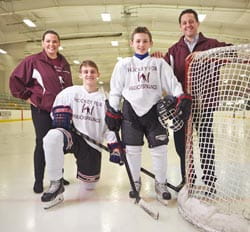You wouldn’t know that Case, who spends hours speeding up and down the ice at hockey practice, was anything other than an active little boy. But soon after he was born in 2001, his mother Leslie Haberstroh knew something wasn’t right. He couldn’t hold down his baby formula, and he was unable to pass his newborn stool or meconium. “It was the typical signs of Hirschsprung’s or a blockage,” said Leslie. Case was soon sent to UPMC Children's Hospital of Pittsburgh where he underwent a biopsy under the care of a team of doctors.
The biopsy revealed an intestinal issue, which led to Case’s diagnosis of Hirschsprung’s disease. The congenital condition occurs in about one in every 5,000 births and causes the large intestine to not perform its normal functions. At only 7 days old, Case was scheduled for surgery to remove the diseased section of his colon. Leslie says for such a scary situation, she felt relatively at ease. The UPMC Children’s Hospital staff “was very supportive." "You have confidence in their care. I was very calm in my feelings toward everything they were doing.”
After surgery, Case spent 3 weeks recovering in the Neonatal Intensive Care Unit. The doctors wanted to ensure that everything had gone properly with the procedure, that his intestines didn’t twist, and that he could keep formula down. After passing these tests, baby Case was sent home. Three months later, Case returned to UPMC Children’s for a second surgery called a pull-through. Since then, he hasn’t had any operations and only takes medication on an as-needed basis. Case participated in a research study at UPMC Children’s for nearly eight years in order to help other children with Hirschsprung’s disease.
Case’s symptoms didn’t disappear totally, however. He still experiences abdominal discomfort, especially after eating. Still, Case says lunch is one of his favorite subjects at school. The discomfort, however, can cause missed class time, leaving him behind on instruction. Luckily, a few helpful teachers and Case’s determination to do well and keep up with his brother have allowed him to reach his goals. Both Case and Leslie know how hard it can be to send a young Hirschsprung’s patient off to school. That’s why Leslie wanted to raise awareness and offer support to families who were experiencing the same thing that she went through a few years earlier.
Hockey for Hirschsprung’s
 The Haberstroh family wanted to raise awareness about Hirschsprung’s and offer support to other families who have children with the disease. To do this, Case decided to bring together hockey and Hirschsprung’s, two things close to his heart. In September 2014, the Haberstroh family organized the first annual “Hockey for Hirschsprung’s” youth ice hockey tournament.
The Haberstroh family wanted to raise awareness about Hirschsprung’s and offer support to other families who have children with the disease. To do this, Case decided to bring together hockey and Hirschsprung’s, two things close to his heart. In September 2014, the Haberstroh family organized the first annual “Hockey for Hirschsprung’s” youth ice hockey tournament.
The goal was to raise awareness, raise money, and inspire other kids. Case wanted to show that it is possible to lead a normal life with the disease. “I can do lots of stuff that all my other friends can do,” Case said.
The week-long event at the Belmont Complex in West Kittanning attracted 12 amateur teams for a round-robin tournament. The winners were presented with ice-like medals and a banner. The first annual event raised $3,500 for the Colorectal Center for Children. “I felt pretty good that I could give money to kids [with Hirschsprung’s],” said Case. Overall, the tournament was a success. The Haberstroh clan connected with 2 other families that had young kids with Hirschsprung’s. They shared tips and advice, but most importantly support. “So much support came out of this,” Leslie said. The 2nd Annual Hockey For Hirschsprung’s tournament is scheduled for August 26-30 & September 2-6, 2015 and is now fielding 24 teams.
Today, the hockey-loving teenager gets more ice time than hospital time, and he and his family have turned their love of the sport in to a chance to help other children suffering from Hirschsprung’s. In the future, Case hopes to go to a “good college” and play on their hockey team. His mother Leslie knows that “whatever he does, he will be successful. He’s very driven.” These days, nothing seems to be holding Case back.
Contact Us
For an appointment or consultation, Contact the Colorectal Center for Children.









